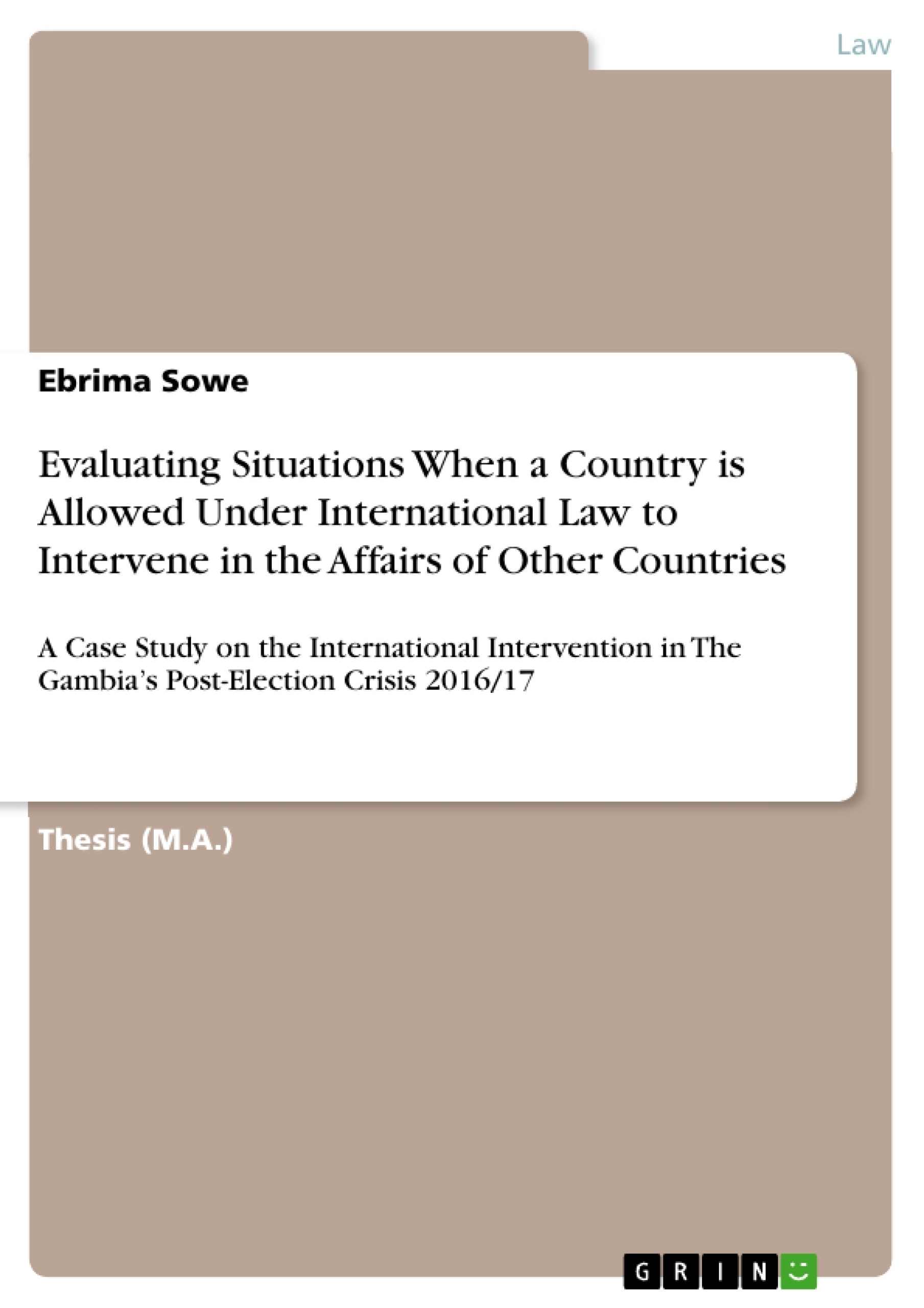This thesis aims to study the legality of unilateral and regional intervention by states through the influence of regional and or sub-regional organizations in the context of the international law principle of non-intervention focused on the Gambia Post- election crisis 2016/17 as a case study.
This paper will give a legal descriptive analysis of the International law principle of non-intervention as this area is one of the most controversial concepts of international law. In the process of discussing this research area, I will be analysing the legality and legitimacy of International interventions in the Gambia post-election crisis 2016/17 and in the process, assess the legitimacy of contemporary interventions in their determining factors.
In Chapter 1, this thesis contains a general assessment of whether humanitarian intervention is consistent with the purposes of the United Nations which is highly debatable in the academic field of International law. In assessing this question, an evaluation is made on the interpretation of Article 2(4) of the UN Charter.
Chapter 2 of this thesis contains an elaborate discussion on The Gambia Post-election crisis and seeks to answer whether the threat to use of force by ECOWAS and AU was actually authorised by the Security Council in Resolution 2337(?). Other Forms of intervention are as well revisited in the discussion to assess whether the Use of Force and intervention by African regional organization ECOWAS was consistent with the UN Charter. This Chapter also gives a bird’s eye view on the mandate of regional organizations and an evaluation of their legal instrument in relation to The Gambia as a member of such African organizations. This includes a discussion on Gambia’s status on the ECOWAS Protocols.
Finally, Chapter 3 focussed on the new trend of Pro-democratic Intervention in Africa, and how the Gambia’s case study is of good or bad precedence.
Inhaltsverzeichnis (Table of Contents)
- Introduction
- 1. THE CONCEPT OF INTERVENTION AND THE PRINCIPLE OF NON-INTERVENTION UNDER INTERNATIONAL LAW
- 1.1 The evolution of the principle of Non-Intervention under the UN Charter.
- 1.2 The interpretation of Article 2(4) of the U.N. Charter.
- 1.3 The Principle of Non-Intervention in the context of the African Union and ECOWAS regional and sub-regional organizations.
- 2. THE LEGALITY OF AFRICAN REGIONAL INTERVENTION IN THE GAMBIA AND THE CONCURRENT POSITION OF THE U.N. CHARTER ON SUCH DEVELOPMENTS.
- 2.1 The mandate of regional arrangements and their role in dispute settlement under the U.N. Charter and Multi-lateral Treaties.
- 2.2 The legal status of the Gambia on the ECOWAS' Protocol on Democracy and Good Governance (A/SP1/12/01).
- 2.3 The question of legitimacy under domestic laws of The Gambia.
- 2.4 The position of the U.N. Security Council with regards to the regional intervention in the Gambia Post-election Crisis.
- 2.5. The threat of the Use of Force in The Gambia by the ECOWAS & AU regional organization.
- 3. PRO-DEMOCRATIC INTERVENTION IN CURRENT INTERNATIONAL LAW: GOOD OR BAD?
- 3.1 Legal Justification of Political Intervention under International law.
- 3.2 Intervention by consent and the question of \"who is in control to give consent\" in a dilemma of legitimacy?
- 3.3 Opinion on Pro-democratic Intervention: Good or Bad?
- Conclusion
Zielsetzung und Themenschwerpunkte (Objectives and Key Themes)
This thesis aims to analyze the legality of unilateral and regional intervention by States through the influence of regional and/or sub-regional organizations in the context of the international law principle of non-intervention, focusing on the Gambia Post-election crisis 2016/17 as a case study.
- The evolution and interpretation of the principle of non-intervention under international law.
- The legality of regional intervention in the Gambia Post-election crisis.
- The role of the United Nations Charter and regional organizations in international intervention.
- The legitimacy of pro-democratic intervention in current international law.
- The application of the principle of non-intervention in the context of the Gambia's domestic legal framework.
Zusammenfassung der Kapitel (Chapter Summaries)
Chapter 1 provides a general overview of the principle of non-intervention under international law, examining its historical development and contemporary interpretation. It analyzes the role of the United Nations Charter in prohibiting intervention in the domestic affairs of other states, including the interpretation of Article 2(4) of the Charter. This chapter also examines the principle of non-intervention in the context of regional and sub-regional organizations such as the African Union and ECOWAS.
Chapter 2 focuses on the specific case of the Gambia Post-election crisis of 2016/17. It examines the legitimacy of the intervention by ECOWAS and the African Union in light of the UN Charter. The chapter analyzes the mandates of regional organizations and their legal instruments in relation to The Gambia as a member state. It also discusses the legal status of The Gambia under the ECOWAS Protocol on Democracy and Good Governance.
Chapter 3 examines the contemporary phenomenon of pro-democratic intervention in Africa, using the Gambia case study to explore the potential benefits and drawbacks of such interventions. This chapter explores the legal justifications for political intervention under international law, including the concept of intervention by consent. It also examines the question of legitimacy when determining who has the authority to consent to intervention.
Schlüsselwörter (Keywords)
This thesis explores the complex interplay of key concepts including international law, non-intervention, sovereignty, regional intervention, pro-democratic intervention, the United Nations Charter, the African Union, ECOWAS, and the Gambia Post-election crisis.
- Quote paper
- Ebrima Sowe (Author), 2021, Evaluating Situations When a Country is Allowed Under International Law to Intervene in the Affairs of Other Countries, Munich, GRIN Verlag, https://www.grin.com/document/1244881




